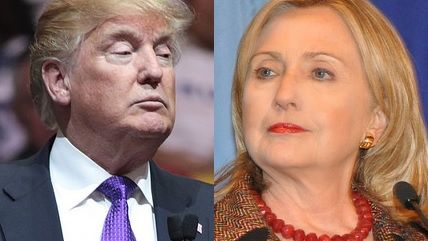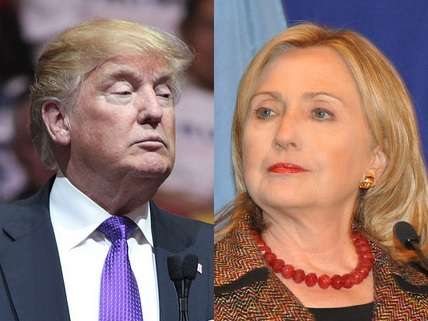It Doesn't Matter Whether Hillary Clinton or Donald Trump Is Worse
Same song, different strongman


Last week Republicans nominated Donald Trump, whose speech reinforced the idea that he was running as a nightmarish strongman. This week Democrats convene in Philadelphia to nominate a strongman strongwoman of their own. A lot of ink was spilled on Friday explaining just how dangerous Donald Trump was, a toxic mix of fearmongering, disregard for Constitutional processes, and white identity politics. None of these elements are particularly new, although Trump's transparent disregard for political norms makes them especially dangerous.
Libertarians and critics of ever-expanding government have long been warning about the danger of the centralization of federal power. And the imperial presidency has been a century-plus-long project. Historian Arthur Schlesinger, Jr. released The Imperial Presidency in 1973, the year Congress passed the War Powers Act to rein in a presidency that had been accumulating more and more war powers. In 2011, then Secretary of State Hillary Clinton told members of Congress President Obama would ignore their war resolutions in regards to U.S. intervention in Libya, and the administration ignored the 60-day limit for unauthorized military operations imposed by the War Powers Act. The executive branch now runs 17 different spy agencies.
And since 1973, the executive branch of the federal government has acquired four new departments—the Department of Energy in 1979, the Department of Education in 1979, the Department of Veterans' Affairs in 1989, and the Department of Homeland Security in 2002. Each has expanded not just federal policy beyond the purview of the Constitution, but the power of the presidency. Issues surrounding the departments has fueled controversies over issues from the nationalization of school curriculums through programs like Common Core to the federalization of domestic policing to the inevitable mismanagement of a federal veterans healthcare program that was vaunted as a model for nationwide socialized medicine.
Federal regulations and the bureaucracy required to enforce them have grown and continue to grow as well, leading to an explosion in armed federal agents operating for the executive branch on matters ranging from agricultural enforcement to the war on drugs. These are the powers presidential candidates like Trump and Clinton vie to use. The powers are more frightening, and dangerous, than any particular person who might wield them, especially as the increasingly rudderless and out-of-touch parties make it easier for populist demagogues to try to take over.
The imperial presidency and a strong unilateral executive in a Constitutional system with three nominally co-equal branches of government, has also benefited from a constant bipartisan tu quoque in response to criticisms. "Bush did it," so now it's okay to do. Both major parties have complained in turns about a "dysfunctional" and "obstructionist" Congress and a "crippled" judiciary, usually as a reason more power should flow from the legislative or judiciary branches to the executive.
While Donald Trump pledges that he alone can solve a myriad of problems in the United States, he is not alone in doing that. Hillary Clinton envisions a role for government in all aspects of life, far outside any of the roles prescribed in the Constitution. A few months ago, she offered up Australia, which confiscated guns after a mass shooting in the 1990s, as a "good example" of common sense gun restrictions. "If Congress refuses to act, Hillary will take administrative action" on gun laws, her campaign boasts. In June Jacob Sullum wrote it was pretty clear Clinton does not believe Americans have a constitutional right to guns. Progressives skeptical of, if not hostile to, gun rights don't see this kind of transparent attempt to roll back a civil liberty, and unilaterally to boot, as a dangerous misuse of executive power, but as a courageous act.
But what if it were the First Amendment Clinton were assaulting? That's not a hypothetical—setting aside her self-interested support for the repeal of Citizen's United, a case that found that the non-profit group Citizens United could not release a film critical of Clinton too close to the 2008 presidential election, and the way limits on political speech are used by those in power to silence opposition, Clinton has waged a decades-long war on free speech. Back in December, Clinton suggested the government work with U.S. tech companies to target terrorists' activities on the Internet. "You are going to hear all of the familiar complaints" about freedom of speech, she warned. Trump echoed those sentiments a day later. "We're losing a lot of people because of the internet," Trump said at a rally. "We have to see Bill Gates and a lot of different people that really understand what's happening. We have to talk to them about, maybe in certain areas, closing that internet up in some ways. Somebody will say, 'Oh freedom of speech, freedom of speech.' These are foolish people." Trump's comments, because they included a reference to a tech company leader known from the 1990s, received more play, but they were substantively the same.
In 2012, when the White House believed President Obama might lose his re-election bid, the administration sped up work on rules to limit the president's power to unilaterally conduct a drone war across the Muslim world. Those rules never materialized. Glenn Greenwald noted in December that while Trump's ban on Muslims was "wildly dangerous" it was not far outside the American political mainstream. "It's important not to treat Trump as some radical aberration," Greenwald wrote. "He's essentially the American id, simply channeling pervasive sentiments unadorned with the typical diplomatic and PR niceties designed to prettify the prevailing mentality.
That lack of niceties makes Trump's disregard for Constitutional processes particularly, but uniquely, dangerous. Trump has similarly channeled the prevailing mentality on immigration. Trump's promise to deport more than 10 million undocumented immigrants is not new among Republican presidential candidates, and the Obama has ramped up the size of the border patrol and deportations during his term. "This is not what we knocked on millions of doors for in '08 & '12…to see our hispanic refugee women and children targeted and annihilated yet again by the President we campaigned so hard to elect," wrote departing DNC staffer Pablo Manriquez on Facebook before taking the post down at the behest of the DNC, as revealed in an email database from the Democratic National Committee leaked to Wikileaks. Manriquez was responding to House Minority Leader Nancy Pelosi's concerns over new deportation efforts targeting asylum-seekers escaping violence in Central America. "During both campaigns we were scripted to promise relief," Manriquez continued. "We're all made liars with every hispanic refugee family we tear apart."
Never Trump Republicans say they're genuinely concerned about Donald Trump, yet most have not endorsed Gary Johnson or some other candidate they believe would adhere to and enforce the constitutional limits on government power. More of them have endorsed Clinton, who continues the project of expanding executive power without the nasty overtones of the Trump campaign.
Donald Trump's insistence that he alone can solve America's problem, and his apparent willingness to go it alone trying to do it, is dangerous, as is the pervasive idea that any government can solve every problem. "I've got a pen and I've got a phone," President Obama said of taking action without a Congress for which he could no longer wait to act on a slew of issues. It's as good a metaphor of the power that's accumulated in the presidency as any. Donald Trump is dangerous, as Clinton and other would-be strongmen are dangerous, because of the power accumulated in the pen and the phone.
"We can't wait," one Obama initiative circumventing Congress declared. Trump tells voters they don't have to. And a lack of understanding of the republican nature of U.S. "democracy" leaves voters with no reason to think they should.


Show Comments (210)